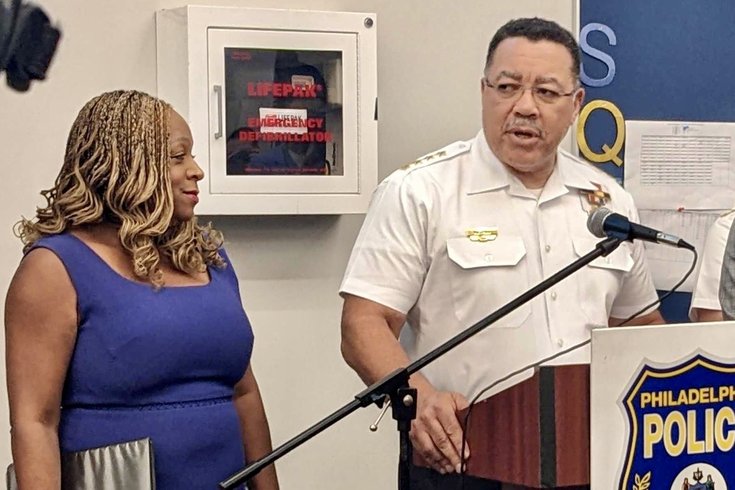
August 22, 2024
 Michaela Althouse/PhillyVoice
Michaela Althouse/PhillyVoice
Police Commissioner Kevin Bethel and Councilmember Jamie Gauthier introduced a number of measures to improve the 911 call center.
Philadelphia police made upgrades to its 911 call center to improve response times and employee retention, officials said Thursday.
Among the changes include increasing pay for dispatchers and allowing civilians, instead of just police officers, to apply for supervisor roles. These moves come after the police department received $33.5 million in additional funding in Mayor Cherelle Parker's 2025 budget.
The push to make changes stems from an incident last summer when police went to the wrong address in response to a 911 call about a shooting, and nearly two days later the alleged gunman went on a rampage.
On July 3, 2023, Kimbrady Carriker, 40, fired at least 50 shots near 56th Street and Chester Avenue, killing four people and injuring four others. A fifth person was thought to have been killed in that incident, but evidence later showed that Joseph Wamah Jr. had been shot by Carriker at the same location but at an earlier time.
Wamah died during the early-morning hours of July 2. Reports of gunfire on that block had been called in to 911, but police were sent to North 56th Street instead of South 56th Street, three miles away, and thus found no evidence of a shooting.
"This response cost the police department 44 hours it could have used to investigate Mr. Wamah's death before the shooter allegedly returned to the same spot and committed four more murders," said Councilmember Jamie Gautier, who called a hearing after the incident. "And it shook the community's trust in the city's ability to successfully respond to emergencies."
Among the changes at the 911 call center, dispatchers will greet callers by asking, "What's the location of your emergency?" and "Does this address have a directional indicator?" instead of "How can I help you?" If officers respond to a call but find nothing at the location, they can call their supervisor who can access location information from the person that contacted 911 to see if responding officers received an incorrect address. If a supervisor calls the initial 911 complainant back to verify information, that call will be recorded.
To improve retention and recruiting efforts, dispatchers will also receive a 10% pay increase from the city's budget for police – 5% from a contractual increase and a 5% raise. On average, Philadelphia dispatchers make $48,000 to $50,000 a year, where dispatchers in surrounding counties make as much as $65,000 annually. There are about 300 dispatchers in the city, police said, but an additional 60 positions are in the budget.
Additionally, police established a civilian police radio dispatcher supervisor position, offering a career advancement option for dispatchers. Previously, supervisors could only be police officers, which made it difficult to retain dispatchers long term.
"It was unacceptable to understand how we have these men and women who are giving each and every day, the work that they do, but not being able to provide a supervisory track for them to move up in their work," Police Commissioner Kevin Bethel said.
Police will also be moving to a new system for calls that will allow for more location transparency, including allowing dispatchers to see where police cars are parked. Bethel said he expects that to come online next year.
Deputy Commissioner Krista Dahl-Campbell said they're also building up mental health initiatives for both dispatchers and police officers, including hiring a new director of health and wellness.
"Philadelphians can rest easier knowing that our 911 call center has never been better equipped to provide every single caller with professional and responsive service," Gauthier said.